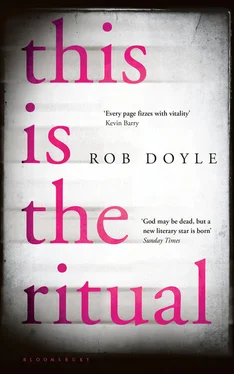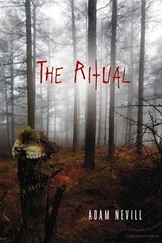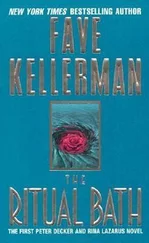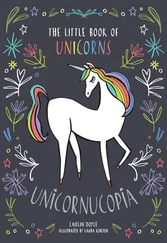Rob Doyle - This is the Ritual
Здесь есть возможность читать онлайн «Rob Doyle - This is the Ritual» весь текст электронной книги совершенно бесплатно (целиком полную версию без сокращений). В некоторых случаях можно слушать аудио, скачать через торрент в формате fb2 и присутствует краткое содержание. Год выпуска: 2016, Издательство: Bloomsbury Publishing, Жанр: Современная проза, на английском языке. Описание произведения, (предисловие) а так же отзывы посетителей доступны на портале библиотеки ЛибКат.
- Название:This is the Ritual
- Автор:
- Издательство:Bloomsbury Publishing
- Жанр:
- Год:2016
- ISBN:нет данных
- Рейтинг книги:5 / 5. Голосов: 1
-
Избранное:Добавить в избранное
- Отзывы:
-
Ваша оценка:
- 100
- 1
- 2
- 3
- 4
- 5
This is the Ritual: краткое содержание, описание и аннотация
Предлагаем к чтению аннотацию, описание, краткое содержание или предисловие (зависит от того, что написал сам автор книги «This is the Ritual»). Если вы не нашли необходимую информацию о книге — напишите в комментариях, мы постараемся отыскать её.
This is the Ritual — читать онлайн бесплатно полную книгу (весь текст) целиком
Ниже представлен текст книги, разбитый по страницам. Система сохранения места последней прочитанной страницы, позволяет с удобством читать онлайн бесплатно книгу «This is the Ritual», без необходимости каждый раз заново искать на чём Вы остановились. Поставьте закладку, и сможете в любой момент перейти на страницу, на которой закончили чтение.
Интервал:
Закладка:
Coining the term ‘Nazi-pastoral’ to describe an almost aggressively uncategorisable work, critics were not quite sure how seriously to take its plotless, meticulously realised, deadpan portrait of an alternative, Nazified Ireland in which Hitler’s plan has come to pass. Written in a documentary style recalling sociological surveys and governmental reports, The Garden was, according to one critic, ‘either a joke in questionable taste, or the nostalgic, vindictive fantasy of a confused and lonely man, whose bitterness has bred a disingenuous sympathy for the Nazis and for Hitler’. Indeed, defenders of the book, who insisted it was an extended exercise in cautionary irony, foundered when they tried to explain away the all-too-convincing sincerity in Turner’s depictions of a bucolic Ireland run by communities of agrarian fascists, where cheery colleens Irish-dance around swastikas, and boys in the Hitler Youth of Ireland (whose honorary president is W. B. Yeats) are taught to hunt, cook and swim, whilst having their imaginations fed by Celtic and Nordic mythology, and receiving lessons in the rudiments of Darwinism and race theory.
Thus far, sexuality had had a somewhat muted presence in Turner’s work. Turner himself appears to have always been at ease with his own homosexuality (or strong homosexual tendencies), even if he was reluctant to publicise it in the conservatively Catholic Ireland where he had come of age. In Berlin, however, Turner took full advantage of the city’s fierce permissiveness to explore this sexuality in a deeper way than had been possible hitherto. The discoveries he made in the course of these explorations, based on his writings subsequent to The Garden , were strange and disturbing, hinting at the darkest recesses of the Sadean imagination. ‘It was as if’, writes one of Turner’s most perceptive and sympathetic critics, ‘[he] came to view his sexuality, and beyond that, the broader configuration of his instinctual drives, as a kind of map or diagram in which he could discern, in microcosm, all the horrors and psychopathology — political, social, personal — of thetraumatic century into which he had been born.’ 4
Abandoning the last vestiges of conventional narrative fiction, and taking as his new literary models Bataille, 5Sade and Burroughs, Turner ventured into murky, often questionable artistic territories. At the same time, and with equal conviction, he conducted countless nocturnal forays into Berlin’s transgressive, erotic underworld. His most grotesque or bizarre adventures found their way into the writings of this period — writings which convey the unholy, anarchic allure of the Berlin night, in pages crowded with masochistic dog-men, dungeon-crawling ‘spiritual abortions’, bald women draped in chains ‘with vaginas in their armpits and armpits in their vaginas’, weeping teenage prostitutes from the Soviet hinterlands, and mute rent-boys with pure and sorrowful visages.
By this time, Turner had learned German well enough to hold a series of unglamorous jobs in Berlin (he was not making nearly enough from his writing to live on). He worked for a spell as a night-watchman on building sites on the fringes of the city. Then he got a job as a caterer on trains connecting West Berlin to various cities to the north. In one of his most difficult passages, Turner writes of the strange happiness he experienced in this job, peering out the windows at ‘the silent dream of passing German landscape, a sublimely dreary post-industrial idyll whose every inch sang of holocaust — of the holocaust already passed and the holocausts to come, for all infinity, an eternal recurrence of this most perfect human exaltation and nightmare, the ecstatic vision of an engineered hell. . And then I would interrupt my window-gazing reveries and, suffused with a world-embracing love like that described by the mystics, serve Coca-Cola, orange juice and ham sandwiches to beautiful German children and their waddling parents.’ 6
It is at this point that a heavier fog descends on the biographical trail; fact, fiction and hallucination become impossible to separate. Most of what follows cannot be verified as factual truth, having been pieced together from Turner’s perilous later writings and the sparse accounts of those who knew him at the time. It is entirely possible that most of what is here recounted bears no relation to events that took place in external reality. However, it is the author’s belief that what follows is, at least, an approximation of the reality that pertained within the troubled psyche of Killian Turner in the period leading to the autumn of 1985. The only events which undoubtedly did take place are those of Turner’s disappearance and the subsequent investigation; the rest must be considered either metaphor or speculation.
In November or December of 1984, Turner agreed to collaborate on an industrial-noise track with a musician friend, Heinrich Mannheim, who he knew through the S/M underworld. Mannheim’s band, Sublime Ascent, was at the extreme end of the thriving noise-music scene in Berlin in the eighties. They took their cue from bands like Whitehouse, whose aesthetic of extreme violence and sexual cruelty Mannheim considered the only cultural form immune to assimilation by the capitalist-consumer system. Sublime Ascent are reported to have incorporated images and video footage of war atrocities, executions and torture into their infrequent live shows. It has even been rumoured that, in one extremely secretive performance in a disused governmental premises on the fringes of either Frankfurt or Dresden, the band improvised a set to the prolonged, ritualistic killing of a consenting and ecstatic male, hands bound and on his knees, a series of cuts made on his naked torso.
The tapes said to have resulted from the collaboration between Sublime Ascent and Killian Turner have become the holy grail of Turner aficionados. On the recordings, Turner is thought to have read from a collage made up of his own texts and those of Georges Bataille, possibly spliced with certain passages from Sade and Nietzsche, and transcripts of the commentary from the 1982 World Cup. He read over a sprawling sound-texture that lurched between extreme noise and eerie, dark-ambient sonic wasteland, performed live by Sublime Ascent. Present at the recording was a forty-something man with long, greying hair and a bushy, black moustache who was never to be seen without his wraparound sunglasses, his overall appearance suggesting a somewhat seedier Carlos Santana. This was the figure Turner would refer to in his writings sometimes as Frank Lonely, but more often as Mother D. After watching the recording session whilst drinking several cups of herbal tea, Frank Lonely/Mother D remarked that he admired the text which Turner had read, or at least what he had understood of it (his English was imperfect), and thought he had recognised certain phrases from Georges Bataille. When the day’s recording was finished, the two men went out for a drink and ended up talking long into the night — about art, music, love and politics. Turner eventually stumbled back to his Friedrichshain apartment as a murky dawn broke over Berlin, rarely in his life having laughed or enjoyed himself so much.
The diaries Turner kept in the months immediately preceding his disappearance detail his intense, at times all-consuming friendship with Mother D. The two men shared a love for Bataille, for underground American rock bands like Suicide and Big Black, and, bizarrely, for most varieties of animated film, but especially those produced by the Disney corporation. Turner and Mother D would spend their weekends visiting cinemas all over the city, watching Bambi, The Jungle Book, Snow White and the Seven Dwarfs , and whatever other feature-length cartoons they could find (they appear to have had no interest in shorter fare, such as animated TV series). ‘In the presence of Mother D I re-embody the child I never truly was,’ wrote Turner, ‘which in turn prepares me, spiritually if not fizzically [sic] for what is to come, i.e. the great radiance/the crossing/the sacred blah-blah-blah.’ 7
Читать дальшеИнтервал:
Закладка:
Похожие книги на «This is the Ritual»
Представляем Вашему вниманию похожие книги на «This is the Ritual» списком для выбора. Мы отобрали схожую по названию и смыслу литературу в надежде предоставить читателям больше вариантов отыскать новые, интересные, ещё непрочитанные произведения.
Обсуждение, отзывы о книге «This is the Ritual» и просто собственные мнения читателей. Оставьте ваши комментарии, напишите, что Вы думаете о произведении, его смысле или главных героях. Укажите что конкретно понравилось, а что нет, и почему Вы так считаете.












